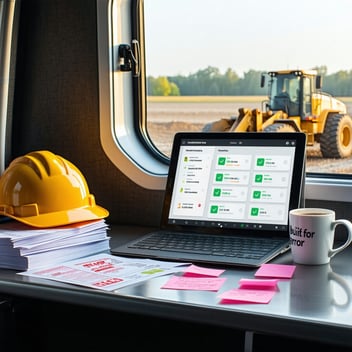Time tracking tools can help improve efficiency for financial teams in the construction industry – from the field, the office, or while working remotely.
Table of Contents
- What is Construction Time Tracking Software?
- Why do general contractors need time tracking software?
- How do I evaluate and compare different construction time tracking software providers?
- What are some of the consequences of not using time tracking software to run my general contracting business?
- How can contractors use Remote Payroll to automate the process of managing multiple payroll tasks?
- What’s next?
What is Construction Time Tracking Software?
Construction Time Tracking Software is a software solution designed to help construction companies track and manage their employees' time and attendance on job sites. It allows construction managers to monitor the hours worked by their team members and ensure that time is recorded accurately.
The software typically includes features allow you to enter time, allocate time to jobs for more accurate job costing, reporting that increases visibility. It allows managers to track employee hours and job costs in real time, helping them make informed decisions about staffing, scheduling, and resource allocation.
Construction time tracking software can be used to reduce errors and inaccuracies in payroll processing, minimize overpayments, and streamline job costing. It also helps construction companies ensure compliance with labor laws and regulations.
Overall, the complexity of today’s construction business requires some form of automated tool to help with time tracking. For any construction business looking to increase efficiency, productivity, and profitability, time tracking software is essential.
Why do general contractors need time tracking software?
General contractors are project management experts. But not only are they managing projects, they’re also hiring and supervising subcontractors, getting building permits, scheduling inspections, among many other things. The more administrative tasks they can automate, the more they can focus their time on running their business. That’s why General Contractors need time tracking software for several reasons:
Accurate time tracking
Time tracking software ensures that employees accurately track the time they spend working on each project, which is essential for project management, billing, and payroll processing.
Improved project management
With real-time data on employee hours and job costs, general contractors can better manage their projects, allocate resources effectively, and avoid overruns and delays.
Reduced errors and fraud
Time tracking software minimizes the risk of errors and fraud in payroll processing, which can be costly for general contractors.
Increased productivity
Time tracking software can help general contractors identify areas where employees are spending too much time or where resources are being wasted, allowing them to optimize their operations and increase productivity.
How do I evaluate and compare different construction time tracking software providers?
When evaluating and comparing different construction time tracking software providers, here are some key factors to consider:
Features: Look for software that includes the features you need, such as time entry, job costing, and reporting.
Ease of use: Consider how easy the software is to use and whether it has a user-friendly interface that your employees can quickly learn and use.
Integration: Check whether the software integrates with other tools you use, such as payroll systems, accounting software, or project management software.
Cost: Look at the pricing of each software provider and compare it to the features included. Consider whether the software is priced per user, per project, or based on some other metric.
Customer support: Consider the level of customer support offered by each software provider, such as phone and email support, online documentation, and training resources.
Reviews and reputation: Look at customer reviews and ratings for each software provider to gauge their reputation and customer satisfaction.
Customization: Consider whether the software can be customized to meet your specific needs and requirements.
By considering these factors, you can evaluate and compare different construction time tracking software providers and choose the one that best fits your business needs and budget.
What are some of the consequences of not using time tracking software to run my general contracting business?
There are many benefits of using time tracking software to help improve your productivity as a General Contractor. However, every business is unique, and it may not be a right fit for you right now. We’ve looked at some of the benefits of using a time tracking tool, now let’s take a look at some of the negative consequences of not having time tracking software in place:
Inaccurate employee time tracking:
Without a time tracking tool, you may rely on manual methods, such as paper timesheets or spreadsheets, to track employee hours worked. This can lead to inaccuracies and errors in calculating employee pay, which can result in underpayment or overpayment of wages.
Reduced productivity: Without accurate data on employee hours worked and job costs, you may struggle to optimize your operations and allocate resources efficiently, resulting in reduced productivity and profitability.
This is where job costing comes into play. At the beginning of a project, numbers are allocated for labor, materials, and other project financials. Coding units to a job and code help the contractor determine how much is left in the budget, the percentage that phase of the project has been completed, and the number of materials that have been used and are remaining.
Inability to comply with labor laws: Without time tracking software, you may struggle to comply with labor laws and regulations, such as minimum wage and overtime rules, which can result in legal and financial consequences.
Lack of transparency and communication: Without time tracking software, you may struggle to communicate with employees and clients about project progress and resource allocation, which can lead to misunderstandings and delays.
Increased administrative time and costs: Without time tracking software, you may spend more time and resources manually processing payroll and managing employee time off and other HR tasks.
How can contractors use Remote Payroll to automate the process of managing multiple payroll tasks?
hh2's Remote Payroll is designed to help contractors automate the process of managing multiple payroll tasks. Here are some ways contractors can use Remote Payroll to streamline their payroll processes:
Time and Attendance Tracking
Remote Payroll allows contractors to track employee time and attendance using mobile devices, including smartphones and tablets. This eliminates the need for manual time tracking and reduces the likelihood of errors associated with manual processes.
Pay Stubs Included
hh2 integrates seamlessly with your accounting system. It is one of the few time tracking and attendance solutions that offers pay stubs for your employees to download right after payroll posts.
hh2's Remote Payroll pushes cost-coded time into accounting to calculate employee paychecks based on their hours worked and other payroll factors, such as overtime and taxes. This saves time and reduces errors associated with manual paycheck calculations.
Multiple Time Entry Methods
The construction industry requires flexibility, and hh2 Remote Payroll is the only solution that offers construction professionals the ability to manage time entry in a manner that suits their needs. The software provides multiple time entry methods that alleviate the time collection process for both managers and employees. Additionally, hh2 Remote Payroll has user-friendly interfaces for both web and mobile devices, which enhances usage and efficiency in the field.
Customizable Approval Process
hh2's Remote Payroll supports support rules-based routing where you have precise control over who enters and approves the time each step of the way. hh2 Remote Payroll supports multiple approval levels, types and report viewers.
Group Access Control
Enhance data accuracy with configurations that restrict access to specific job and coding based on payroll group. This ensures your team is more likely to use the correct code when allocating their labor to jobs and your review process is simpler and more reliable.
Customizable Reports
Contractors can use Remote Payroll to generate customizable reports that provide insights into labor costs, employee productivity, and other key performance indicators. The software allows contractors to create custom reports that meet their specific reporting needs.
What’s next?
If you’re a controller or financial employee who’s serious about eliminating inferior time card solutions like paper, pen, and spreadsheets, then now is the time to invest in a full-scale time tracking software solution. Remote Payroll ends the wasted time and human errors that come with manual time entry. In addition, Remote Payroll integrates seamlessly with the construction industry’s leading accounting systems; that means time entered in the field becomes immediately visible to the main office. Time entry records—coded and approved by the entire management chain—flow seamlessly into accounting.
By enabling employees to log and code time with any device, employees use Remote Payroll as a punch clock to punch in and out for shifts at the job site. If you are interested to learn more about our Remote Payroll construction time tracking software, visit this page to book a demo and see it in action.
Supercharge Your Back-Office
Eliminate manual data entry and manual errors while simplifying nearly every back-office process with hh2's construction solutions.
Blog Transcript



